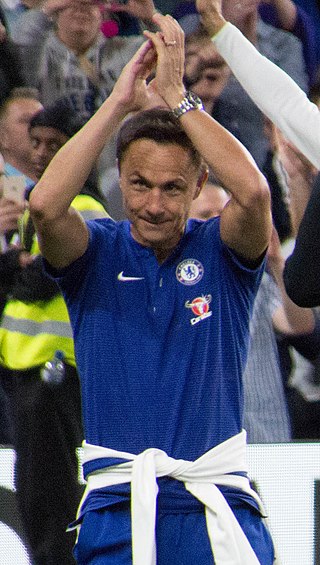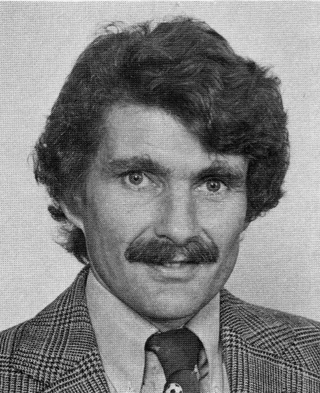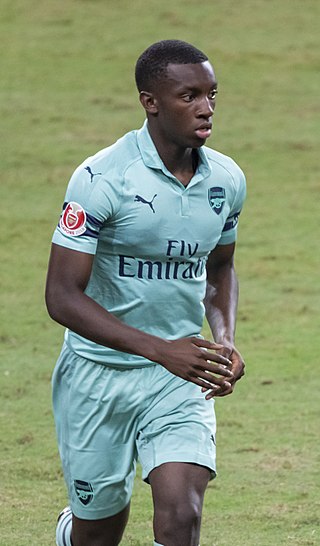Related Research Articles

Peter Philip Bonetti was an English professional footballer who played as a goalkeeper for Chelsea, the St. Louis Stars, Dundee United and England. He was known for his safe handling, lightning reflexes and his graceful style, for which he was given the nickname "The Cat". He was one of several goalkeepers who specialised in a one-armed throw which could achieve a similar distance to a drop kick.

Dennis Frank Wise is an English former professional football player and manager who played as a central midfielder. He is best known for having spent the majority of his career at Chelsea, from 1990 to 2001.

Norman Hunter was an English international footballer who played for Leeds United, Bristol City, Barnsley and England. He also managed Barnsley and Rotherham United. A tough tackling centre-back and defensive midfielder, he won two League Championship medals and one FA Cup-winners medal with Leeds, for whom he played 726 games in total, scoring 21 goals.
Allan John Clarke, nicknamed "Sniffer", is a former professional footballer who played in the Football League for Walsall, Fulham, Leicester City, Leeds United and Barnsley, and won 19 international caps for England.
Anthony William Currie is an English former footballer who had significant spells for Sheffield United, Leeds United and Queens Park Rangers as well as representing England.
Peter Patrick Lorimer was a Scottish professional footballer, best known for his time with Leeds United and Scotland during the late 1960s and early 1970s. An attacking midfielder and the club's youngest-ever player, he was renowned for his powerful strikes from distance. From 1984 to 1985 he was club captain. Lorimer is the club record scorer with 238 goals in all competitions. He was voted Leeds' ninth greatest player ever and on to the greatest Leeds United team of all time.
Francis Tierney Gray is a Scottish football manager and former player. He played for Leeds United, Nottingham Forest, Sunderland and Darlington, while he also represented Scotland 32 times. He managed Darlington, Farnborough Town, Grays Athletic, Woking, Basingstoke Town and Bashley.

Alexander Cyril Stepney is an English former footballer who was Manchester United's goalkeeper when they became the first English club to win the European Cup.
Ronald Edward Harris, known by the nickname "Chopper" for his tough style of defending, is an English former footballer who played for Chelsea in the 1960s and 1970s. Harris captained Chelsea to FA Cup and UEFA Cup Winners' Cup success, and made a club record 795 appearances. His brother Allan Harris was also a professional footballer and they were teammates at Chelsea in the mid-1960s.

Robert Victor Tambling is an English former professional footballer, who played as a forward, most notably for Chelsea, Crystal Palace and England. He was Chelsea's all-time top scorer for 47 years, with 202 goals in all competitions until Frank Lampard surpassed this total on 11 May 2013. Tambling remains Chelsea's all-time top scorer in league competition with 164 goals. After enjoying a successful career in the Football League during the 1960s and early 1970s, Tambling moved to Ireland. He subsequently played for several clubs in the League of Ireland and also represented the League of Ireland XI. After retiring as a player he continued to live in Ireland, residing in Crosshaven, County Cork.

Charles Cooke is a Scottish former footballer. He played as a winger for Aberdeen, Dundee, Chelsea and Crystal Palace, before ending his career in the United States.

The 1970 FA Cup final was contested by Chelsea and Leeds United. The match took place on 11 April 1970 at Wembley Stadium and ended 2–2, making it the first FA Cup final to require a replay since 1912. The replay was staged at Old Trafford and played on 29 April; after four hours of fiercely contested football, Chelsea eventually won 2–1. To date, this is the last time both the final and replay were scheduled to be played in April; all subsequent FA Cup final ties have been scheduled to be played in May, with only the 2020 FA Cup final delayed and played later due to the COVID-19 pandemic.
The 1993–94 season was the 114th season of competitive football in England.
The 1995–96 season was the 116th season of competitive football in England.
The 1969–70 season was the 90th season of competitive football in England.
James McCalliog is a Scottish former football player and coach. He played in the Football League for Chelsea, Sheffield Wednesday, Wolverhampton Wanderers, Manchester United, Southampton and Lincoln City, as well as in the United States with Chicago Sting and in Norway with Lyn.

The 1972 FA Cup final took place on 6 May 1972 at Wembley Stadium. It was the centenary final and the 44th to be played at Wembley.

Ross Barkley is an English professional footballer who plays as a midfielder for EFL Championship club Luton Town.

Oluwafikayomi Oluwadamilola "Fikayo" Tomori is an English professional footballer who plays as a centre back for Serie A club AC Milan. Born in Canada, he plays for the England national team.

Edward Keddar Nketiah is an English professional footballer who plays as a striker for Premier League club Arsenal and the England national team.
References
- ↑ Butler, Frank; Collins, Patrick (1973). News of the World Football Annual 1973–74. London. p. 274.
{{cite book}}: CS1 maint: location missing publisher (link) - 1 2 3 4 5 6 7 8 "Jones the Brave". Yorkshire Post. 31 May 2016.
- 1 2 3 4 5 6 7 8 9 10 Andrew Hutchinson (27 June 2020). "Mick Jones - Memories of a Leeds United number nine". Yorkshire Evening Post.
- ↑ Kevin Markley (11 January 2016). "Hat-Trick Heroes". leedsunited-mad.co.uk.
- ↑ Sniffer: The Life and Times of Allan Clarke.
- 1 2 3 4 "England career statistics - Mick Jones - 3 Caps (0 Goals)". englandstats.com. Retrieved 21 June 2023.
- 1 2 3 4 5 6 7 "Mick Jones". Leeds Fan. Retrieved 26 February 2021.
- ↑ "Leeds United Players Details : No.326 : Jones: Michael David (Mick)". OZ White LUFC. Retrieved 26 February 2021.
- ↑ Vernon, Leslie; Rollin, Jack (1977). Rothmans Football Yearbook 1977–78. London: Brickfield Publications Ltd. p. 491. ISBN 0354 09018 6.
- ↑ Di Maggio, Roberto; Mamrud, Roberto; Rota, Davide; Owsianski, Jarek (8 June 2017). "Champions Cup/Champions League Topscorers". Rec.Sport.Soccer Statistics Foundation (RSSSF). Retrieved 2 November 2017.
- ↑ "Every Leeds United Player of the Season winner since award was first handed out in 1970". Leeds Live. 29 April 2019. Retrieved 4 November 2020.